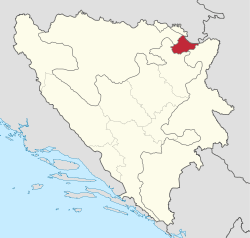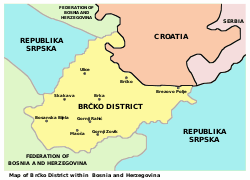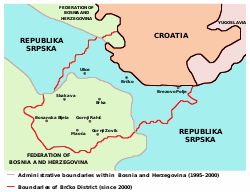Brčko District
Brčko District (Brčko Distrikt / Брчко Дистрикт, pronounced [br̩̂tʃkoː]), officially the Brčko District of Bosnia and Herzegovina (Brčko Distrikt Bosne i Hercegovine / Брчко Дистрикт Босне и Херцеговине), is a self-governing administrative unit in north-eastern Bosnia and Herzegovina.
Brčko District of Bosnia and Herzegovina Брчко Дистрикт Босне и Херцеговине Brčko Distrikt Bosne i Hercegovine | |
|---|---|
Flag Coat of arms | |
 Location of Brčko District within Bosnia and Herzegovina | |
| Coordinates: 44°52′0″N 18°47′0″E | |
| Country | |
| Established by final arbitration decision | 5 March 1999 |
| Statute took effect | 8 March 2000 |
| Seat | Brčko |
| Government | |
| • Mayor | Siniša Milić (SNSD) |
| • President of the Assembly | Esed Kadrić (SDA) |
| • International Supervisor[lower-alpha 1] | Michael Scanlan |
| Area | |
| • Total | 493 km2 (190 sq mi) |
| Population (2013) | |
| • Total | 83,516 |
| • Density | 170/km2 (440/sq mi) |
| Time zone | UTC+1 (CET) |
| • Summer (DST) | UTC+2 (CEST) |
| Postal code | 76100 |
| Area code(s) | (+387) 49 |
| ISO 3166 code | BA-BRC |
| Website | Government website, Assembly website |


Officially a condominium of the Federation of Bosnia and Herzegovina and Republika Srpska, it was formed in 1999 to reflect Brčko and the surrounding areas' multi-ethnic nature and special status within the newly independent Bosnia. In reality, it functions as a local self-government area, much like the other municipalities in the country.
The seat of the district is the city of Brčko.
History
The Brčko District was established after an arbitration process undertaken by the High Representative for Bosnia and Herzegovina. According to the Dayton Peace Accords however, the process could only arbitrate the disputed portion of the Inter-Entity Boundary Line (IEBL).[1] The Brčko District was formed of the entire territory of the former Brčko municipality, of which 48% (including Brčko city) was in the new formed Republika Srpska, while 52% was in the old Federation of Bosnia and Herzegovina. Since the end of the Bosnian War, the European Union (EU) has maintained a diplomatic peace-keeping presence in the area.
Brčko was the only element in the Dayton Peace Agreement which was not finalized. The arbitration agreement was finalized in March 1999 resulting in a "district" as mentioned above which was to be administrated by an American Principal Deputy High Representative who is also ex officio the Brčko International Supervisor.
In 2006, under the Supervisory Order, all "Entity legislation in Brčko District and the IEBL" was abolished. The ruling made by the Brčko Supervisor Susan Johnson abolishes all Entity Laws in the District, as well as abolishing the Entity Border Line. The ruling makes the Laws of the District and the Laws of the State of Bosnia and Herzegovina (including the laws of the Socialist Republic of Bosnia and Herzegovina) paramount within the District.[2]
The first Brčko International Supervisor arrived in April 1997. Prior to that time, the Organization for Security and Co-operation in Europe (OSCE) had a modest office headed by Randolph Hampton. During the interim time before the District of Brčko could be represented post arbitration agreement, local elections were held, and humanitarian relief was provided with cooperation from the United States Agency for International Development (USAID) and ECHO. The District became known as a center for different state-building programs run by foreign governments, particularly the United States.
Following a Peace Implementation Council (PIC) meeting on 23 May 2012, it was decided to suspend, not terminate, the mandate of the Brčko International Supervisor. The Brčko Arbitral Tribunal, together with the suspended Brčko Supervision, continues to exist.[3]
Settlements
- Bijela
- Boće
- Boderište
- Brčko
- Brezik
- Brezovo Polje
- Brka
- Brod
- Bukovac
- Bukvik Donji
- Bukvik Gornji
- Buzekara
- Cerik
- Čađavac
- Čande
- Čoseta
- Donji Rahić
- Donji Zovik
- Dubrave
- Dubravice Donje
- Dubravice Gornje
- Gajevi
- Gorice
- Gornji Rahić
- Gornji Zovik
- Grbavica
- Gredice
- Islamovac
- Krbeta
- Ivici
- Krepšić
- Laništa
- Lukavac
- Maoča
- Marković Polje
- Ograđenovac
- Omerbegovača
- Palanka
- Popovo Polje
- Potočari
- Rašljani
- Ražljevo
- Repino Brdo
- Sandići
- Skakava Donja
- Skakava Gornja
- Slijepčevići
- Stanovi
- Šatorovići
- Štrepci
- Trnjaci
- Ulice
- Ulović
- Vitanovići Donji
- Vitanovići Gornji
- Vučilovac
- Vujičići
- Vukšić Donji
- Vukšić Gornji
Demographics
Ethnic groups
The ethnic composition of Brčko district:
| Ethnic group | Population 1961 |
Population 1971 |
Population 1981 |
Population 1991[4] |
Population 2013[4] |
|---|---|---|---|---|---|
| Bosniaks/Muslims | 16,484 | 30,181 | 32,434 | 38,617 | 35,381 |
| Serbs | 17,897 | 17,709 | 16,707 | 18,128 | 28,884 |
| Croats | 21,994 | 24,925 | 23,975 | 22,252 | 17,252 |
| Yugoslavs | 5,904 | 1,086 | 8,342 | 5,731 | - |
| Others | 673 | 870 | 1,310 | 2,899 | 1,999 |
| Total | 62,952 | 74,771 | 82,768 | 87,627 | 83,516 |
- 1961 census
 Ethnic structure of Brčko by settlements 1961
Ethnic structure of Brčko by settlements 1961 Ethnic structure of Brčko by settlements 1961
Ethnic structure of Brčko by settlements 1961 Share of Bosniaks in Brčko by settlements 1961
Share of Bosniaks in Brčko by settlements 1961 Share of Croats in Brčko by settlements 1961
Share of Croats in Brčko by settlements 1961 Share of Serbs in Brčko by settlements 1961
Share of Serbs in Brčko by settlements 1961
- 1971 census
 Ethnic structure of Brčko by settlements 1971
Ethnic structure of Brčko by settlements 1971 Ethnic structure of Brčko by settlements 1971
Ethnic structure of Brčko by settlements 1971 Share of Bosniaks in Brčko by settlements 1971
Share of Bosniaks in Brčko by settlements 1971 Share of Croats in Brčko by settlements 1971
Share of Croats in Brčko by settlements 1971 Share of Serbs in Brčko by settlements 1971
Share of Serbs in Brčko by settlements 1971
- 1981 census
 Ethnic structure of Brčko by settlements 1981
Ethnic structure of Brčko by settlements 1981 Ethnic structure of Brčko by settlements 1981
Ethnic structure of Brčko by settlements 1981 Share of Bosniaks in Brčko by settlements 1981
Share of Bosniaks in Brčko by settlements 1981 Share of Croats in Brčko by settlements 1981
Share of Croats in Brčko by settlements 1981 Share of Serbs in Brčko by settlements 1981
Share of Serbs in Brčko by settlements 1981
- 1991 census
 Ethnic structure of Brčko by settlements 1991
Ethnic structure of Brčko by settlements 1991 Ethnic structure of Brčko by settlements 1991
Ethnic structure of Brčko by settlements 1991 Share of Bosniaks in Brčko by settlements 1991
Share of Bosniaks in Brčko by settlements 1991 Share of Croats in Brčko by settlements 1991
Share of Croats in Brčko by settlements 1991 Share of Serbs in Brčko by settlements 1991
Share of Serbs in Brčko by settlements 1991
- 2013 census
 Ethnic structure of Brčko by settlements 2013
Ethnic structure of Brčko by settlements 2013 Ethnic structure of Brčko by settlements 2013
Ethnic structure of Brčko by settlements 2013 Share of Bosniaks in Brčko by settlements 2013
Share of Bosniaks in Brčko by settlements 2013 Share of Croats in Brčko by settlements 2013
Share of Croats in Brčko by settlements 2013 Share of Serbs in Brčko by settlements 2013
Share of Serbs in Brčko by settlements 2013
Government and politics
There are 31 seats in the Assembly of the Brčko District. The seats are divided as follows as of 2016:[5]
| Constituency[6] | Council[7] | Mayor[8] elected by Council | ||||||||
|---|---|---|---|---|---|---|---|---|---|---|
| Party | Popular vote | % | Seats | Mayor | Votes | % | ||||
| Brčko | Serb Democratic Party—National Democratic Movement | 5,908 | 15.06 | 5 | Siniša Milić, SNSD | 21 | 68% | |||
| Alliance of Independent Social Democrats | 5,512 | 14.05 | 4 | |||||||
| Party of Democratic Action | 4,989 | 12.72 | 4 | |||||||
| Croatian Democratic Union | 3,940 | 10.04 | 3 | |||||||
| Brčko Democratic Movement | 3,247 | 8.28 | 2 | |||||||
| Party of Democratic Progress—Progressive Srpska | 2,754 | 7.02 | 2 | |||||||
| Croatian Peasant Party of Stjepan Radić | 2,335 | 5.95 | 2 | |||||||
| Union for a Better Future of BiH | 2,049 | 5.22 | 2 | |||||||
| Social Democratic Party | 2,045[9] | 5.21 | 3[10] | |||||||
| Party for Bosnia and Herzegovina | 1,780 | 4.54 | 1 | |||||||
| Socialist Party | 1,773 | 4.52 | 1 | |||||||
| Democratic Front | 1,312 | 3.34 | 1 | |||||||
| Minority candidate Ćazim Dačaj | (384) | – | 1 | |||||||
| Total | 41,772 | 31 | ||||||||
Notable people
- Edo Maajka (birth name Edin Osmić) – rapper
- Lepa Brena (birth name Fahreta Jahić) – pop-folk singer
- Edvin Kanka Ćudić – Human rights activist
- Mladen Petrić – Croatian international football player
- Vesna Pisarović – pop singer
Notes
- Position suspended since 23 May 2012.
References
- Dayton Agreement, Annex 2, Article V Archived April 15, 2007, at the Wayback Machine
- Supervisory Order Abolishes Entity Legislation, Ends Legal Significance of IEBL in Brčko District Archived August 13, 2006, at the Wayback Machine
- Press Conference Following the Meeting of the Steering Board of the Peace implementation Council on 23/5/2012
- "Popis 2013 u BiH – Brčko District". statistika.ba (in Bosnian). Retrieved 29 December 2018.
- GRAFIČKI PRIKAZ SALE SKUPŠTINE BRČKO DISTRIKTA BIH
- The three-digit numbers in the municipality column are the codes used for the municipalities on the Central Electoral Commission site
- (in Croatian)Council results from Central Electoral Commission site
- (in Croatian)Major of Brčko Archived 2018-06-19 at the Wayback Machine
- additional 531 votes from minority constituency
- including one minority candidate
External links
| Wikimedia Commons has media related to Brčko District. |